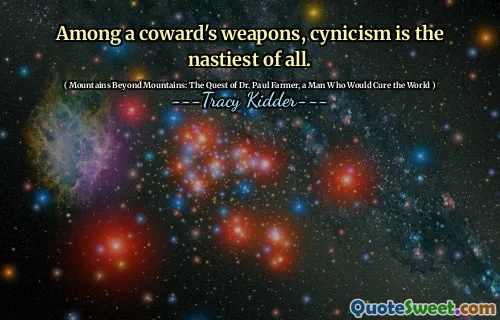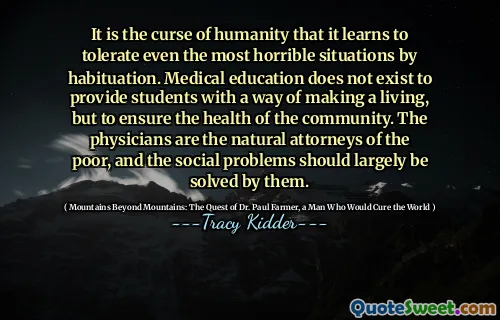
我已经战斗了漫长的失败,并带了其他人来与漫长的失败作斗争,我不会停止,因为我们一直在失败。现在,我实际上认为有时我们可能会赢。我不喜欢胜利。 ...您知道,像大多数Pih-ers一样,来自我们背景的人,就像我一样,我们曾经参加过胜利团队,实际上,我们在PIH中真正尝试做的就是与失败者共同原因。这些是两个截然不同的事情。我们想加入获胜的团队,但冒着背弃失败者的风险,不,这是不值得的。因此,您与漫长的失败作斗争。
(I have fought the long defeat and brought other people on to fight the long defeat, and I'm not going to stop because we keep losing. Now I actually think sometimes we may win. I don't dislike victory. ... You know, people from our background-like you, like most PIH-ers, like me-we're used to being on a victory team, and actually what we're really trying to do in PIH is to make common cause with the losers. Those are two very different things. We want to be on the winning team, but at the risk of turning our backs on the losers, no, it's not worth it. So you fight the long defeat.)
保罗·法默(Paul Farmer)博士在特雷西·基德(Tracy Kidder)的《山脉以外的山脉》(Tracy Kidder)的摘录中,反思了与医疗保健系统性问题作斗争的斗争。他强调了与那些经常被局限或认为社会中“失败者”的人团结的重要性。 Farmer承认,尽管欢迎胜利,但无论持续的挫折如何,争取正义和进步的斗争仍在继续。对他来说,斗争不是关于个人的胜利,而是要提高边缘化。
农民的观点揭示了对社会正义的更深入的承诺,并指出与被剥夺权利的人保持一致至关重要。他试图让他人参与这场漫长的战斗,了解真正的进步可能会很慢,并且充满挑战。他致力于与那些面对巨大逆境的人一起战斗,这强调了创造一个更公平的世界的真正愿望,表明有时旅程本身与结果一样重要。





